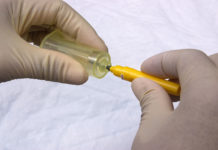
Virtual reality sessions given before sedation during IVF treatment reduce anxiety
Virtual reality sessions can improve pregnancy rates in women undergoing IVF treatment.
New research presented at this year’s Euroanaesthesia congress in Copenhagen, shows that virtual reality (VR) sessions for women prior to sedation for IVF treatment (to become pregnant) reduce their anxiety. This could improve successful pregnancy rate. The study is by Professor Fabienne Roelants, Saint-Luc Hospital, Catholic University of Louvain, Brussels, Belgium, and colleagues.
Along with many other hospital procedures, undergoing fertility treatment can cause stress and anxiety for women. In this study, the authors assessed the effects of two different VR sessions on the level of women’s anxiety during their hospital visit.
After written informed consent, 100 women between 18 and 42 years old scheduled for oocyte retrieval (OR: for in-vitro fertilisation) under sedation were included in a prospective randomised double-blinded study.
The women were randomly assigned one of two types of VR session. In the distraction group (n=56), women received a VR session (an underwater walk cut off from all ambient noise). The hypnosis group (n=44) received a VR session with hypnosis focused on breathing, slowing respiratory rhythm, along with suggestions to repeat the technique later to find well-being and calm as needed (AQUA Oncomfort ®).
There was no statistically significant difference regarding anxiety scores between groups, but in each group anxiety scores decreased (both statistically significant).
“The preliminary results of this study show that VR sessions before sedation for fertility treatment significantly reduce women’s anxiety”
In the distraction group, 48 of 55 women had embryos successfully transferred, but only 10 of these women (22%) were biologically confirmed as pregnant. Only seven of these women (15%) had an ultrasound confirmed successful pregnancy at 12 weeks gestation (termed clinical pregnancy). In the hypnosis group, 35 women had embryos successfully transferred, with 16 of these (46%) biologically confirmed as pregnant, and eight of these (23%) went on the have an ultrasound confirmed clinical pregnancy at 12 weeks.
However, the difference between the hypnosis group and the distraction group for clinical pregnancy was not statistically significant.
The 23% successful clinical pregnancy rate in the hypnosis group is similar to the rate seen in women with no VR session in the authors’ clinic: in 2016, around 1 in 4 (25%) of 1000 treatments given resulted in a successful pregnancy.
Professor Roelants says: “The preliminary results of this study show that VR sessions before sedation for fertility treatment significantly reduce women’s anxiety. The type of suggestions used during hypnosis RV session might show a significant positive impact on the biological pregnancy rate, but not on clinical pregnancy rate at 12 weeks. The small number of patients included at this time precludes any definitive conclusion. We need to repeat the study with around 300 patients in each group to come to definitive conclusions.”
He added : “The effectiveness of virtual reality distraction has been the subject of a systematic review. Virtual reality distraction was shown to be effective to reduce experimental pain as well as the discomfort associated with burn injury care. The technology is being used more and more in medicine, notably in psychiatry to treat phobias.”











